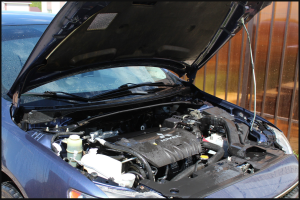Get Pre-Approval Now
- We Buy Cars!
- Click Here!
 You should get an engine diagnostic from your local car dealer annually or every 12,000 miles to assess the condition of the engine and other crucial systems. This comprehensive test can provide valuable insights into hidden problems and save you money on costly repairs. Let’s look at a few important things you can learn from the diagnostic test.
You should get an engine diagnostic from your local car dealer annually or every 12,000 miles to assess the condition of the engine and other crucial systems. This comprehensive test can provide valuable insights into hidden problems and save you money on costly repairs. Let’s look at a few important things you can learn from the diagnostic test.
1. Hidden Engine Issues
A diagnostic test detects serious engine issues not noticeable through visible signs or standard tests. For example, a compression test may show cylinder pressure is within the normal range, but a scan can reveal a faulty camshaft position sensor that could cause engine failure. Scans can also uncover knock sensor issues before major engine damage occurs.
If your “check engine” light comes on, and you can’t pinpoint the problem, a diagnostic test can help. With the accurate results from the test, you will be able to perform immediate repairs and save yourself from an emergency breakdown.
2. Faults in the Braking System
Braking system issues tend to develop slowly over time. Without a diagnostic, worn brake pads, contaminated brake fluid, or minor ABS sensor issues can go undetected until sudden brake failure. Getting regular scans on your car as part of routine maintenance can help detect these problems early. This prevents dangerous braking loss, accidents, and costly repairs.
3. Transmission Problems
A diagnostic test can quickly pinpoint transmission issues with vague symptoms. Is the hard shifting in your vehicle caused by faulty solenoids or worn clutches? Are the gear slips from low fluid or a bad sensor?
Instead of wasting time on guesswork, you can use a diagnostic test to reveal the exact cause of transmission problems. This promotes quick, accurate repairs and allows you to get back on the road quicker.
4. Causes for a Failed Emissions Test
Has your car recently failed an emissions test with no clear reason? If so, a diagnostic test can reveal the exact causes. The test can detect a faulty oxygen sensor that may be providing inaccurate readings to the computer and causing high hydrocarbon levels.
It can also detect a leaking evaporative emissions system valve that’s causing vapor leaks. Before you take another emissions test, get a comprehensive diagnostic test and fix the faults in your emission control system.
5. Estimated Cost of Repairs
Nothing is more frustrating than being slapped with a huge car repair bill you hadn’t prepared for. A diagnostic test unearths all issues in your vehicle, not just the pressing ones. It gives you a full picture of worn components and systems in poor condition, allowing you to budget and plan for future repairs accordingly.
A diagnostic test can provide valuable insight into issues with your vehicle and prevent major breakdowns and costly repairs. Contact Duncan Suzuki to schedule a diagnostic test for your car, truck, or SUV’s engine and other crucial systems.



